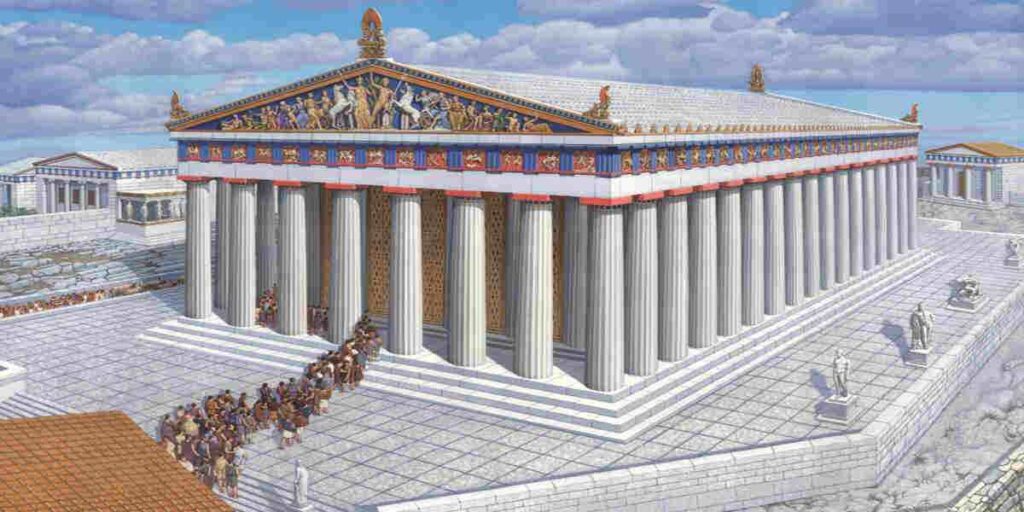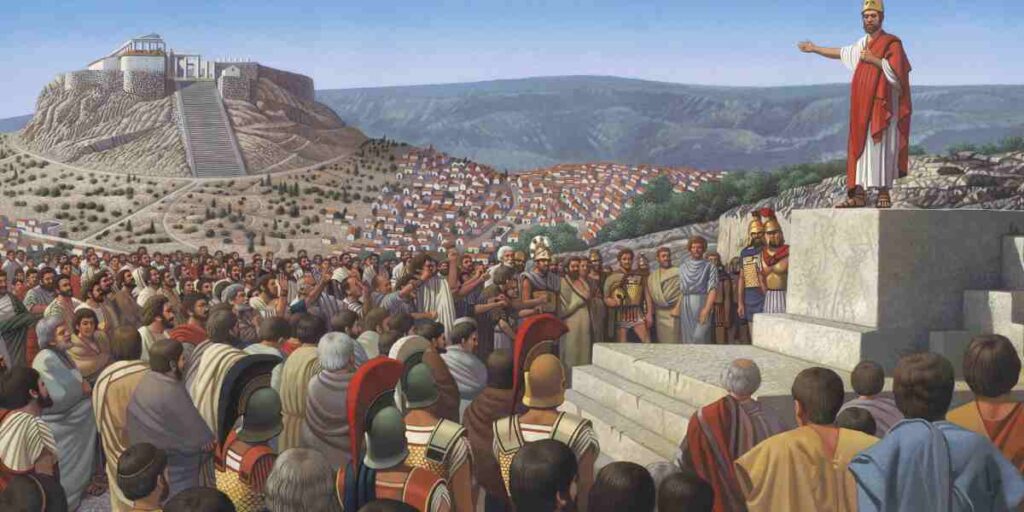Athens is known for its ancient history and famous landmarks like the Palace. But many people don’t know the fun and surprising facts that make Athens even more interesting.
It’s easy to visit Athens and miss out on its quirky side. Most visitors leave without learning about the cool and unique things that make the city special.
To help you see a different side of Athens, we’ve put together 25 fun facts. These will make your trip even more fun and give you a new way to enjoy the city.
25 Facts About Athens
1. Athens is One of the World’s Oldest Cities
Athens is one of the world’s oldest cities, with a history stretching back thousands of years. Archaeologists have found evidence of human settlement in Athens as far back as 4500–4000 BC. This makes it one of the earliest places where people lived and built communities. As you walk through Athens, you are stepping into a city that has seen countless generations come and go.
The city’s rich history is reflected in its ancient landmarks. The Acropolis, for example, has been a center of activity since the Bronze Age. It was here that early Athenians built temples and monuments that still stand today. These structures offer a glimpse into Athens’ past and its role as a major cultural and political hub.
Today, Athens remains a living link to the past. Its blend of ancient ruins and modern life makes it a unique place to explore. Visitors can see historical sites and experience the vibrant culture that continues to thrive in this ancient city. Athens is not just a place with a long history; it is a city where history and the present day are intertwined.
2. Athens is the Oldest Capital of Europe
Athens is the oldest capital city in Europe. Its status as a capital goes back many centuries. Unlike other European capitals, Athens has been a central city for thousands of years. Its long history as a capital city shapes its identity and cultural heritage.
The city’s importance began long before it became the capital of modern Greece. Ancient Athens was a leading city-state in Greece, known for its contributions to art, philosophy, and politics. When Greece became an independent nation in the 19th century, Athens was chosen as the capital because of its historical significance.
Athens continues to be a vibrant capital city. Its rich past is visible in its ancient ruins and historical sites. Visitors can explore landmarks that have stood the test of time and experience the living history of Europe’s oldest capital.
3. Named After the Goddess Athena
Athens is named after the goddess Athena. According to Greek mythology, the city’s name came from a contest between Athena and Poseidon. Both gods wanted to be the city’s patron. Athena won the contest by offering the people an olive tree, a symbol of peace and prosperity.
The olive tree became a symbol of the city. It was said that Athena’s gift provided the people with food, oil, and wood. This gift impressed the citizens and led them to name their city after her. The tree was considered sacred and was a key part of the city’s identity.
The goddess Athena remains an important figure in Athens. Her image can be seen on statues and coins throughout the city. The name Athens honors her legacy and reminds people of the city’s ancient origins.
4. Athens Features Iconic Architectural Styles

Athens is famous for its iconic architectural styles. The city showcases a blend of ancient and modern designs. The ancient buildings, like the Parthenon, highlight classical Greek architecture with its columns and detailed sculptures. These structures are remarkable examples of the Doric, Ionic, and Corinthian styles.
In addition to ancient architecture, Athens also features neoclassical buildings. During the 19th century, many new structures were built in this style. Examples include the National Library and the University of Athens. These buildings reflect a revival of classical aesthetics, blending historical elements with new architectural techniques.
5. The Birthplace of Democracy

Athens is famous as the birthplace of democracy. The word “democracy” comes from two Greek words: “demos,” meaning “the people,” and “kratos,” meaning “power” or “rule.” So, democracy means “rule by the people.” This idea began in Athens more than 2,500 years ago, around 594 BC, when Solon, an Athenian leader, started allowing citizens to have a say in government decisions.
The practice of democracy in ancient Athens was different from what we know today. Only free men who owned property could vote and participate in decision-making. They met at Pnyx Hill, near the Ancient Agora, where they gathered to discuss and decide on important issues. By the late 6th century BC, another leader, Cleisthenes, made changes to make the system even more inclusive, earning him the title “father of Athenian Democracy.”
Today, the democratic ideas that started in Athens have influenced many modern governments. The concept of people having a voice in their government began here and has grown into the democratic systems used around the world.
6. Athens’ Diverse Political History
Athens has a rich and varied political history. In ancient times, it was a powerful city-state known for its democratic government. The city experienced periods of great influence and prosperity, especially during the 5th century BC.
However, Athens also faced many challenges, including wars and political changes. For example, during the Peloponnesian War, Athens fought against Sparta, which significantly impacted its power and stability.
Athens came under the control of different empires. The Romans, Byzantines, and Ottomans all ruled Athens at different times. Each of these periods left its mark on the city, adding to its complex history. Today, Athens is a modern capital city, but its political past is still evident in its ancient ruins and historical sites.
7. Once Not the Capital of Greece
Before Athens became the capital of modern Greece, the city of Nafplio held this title. Nafplio served as the capital from 1829 until 1834 when Athens was chosen due to its historical significance and central location.
Reasons for the Change
- Historical Importance: Athens’ ancient heritage made it a symbolic choice.
- Central Location: Facilitated governance and communication.
- Cultural Hub: Athens was a center of arts and education.
8. Home to Ancient Kings
In its early history, Athens was ruled by a series of kings, such as the legendary Theseus, who united the region of Attica under Athenian rule. The transition from monarchy to democracy marked a significant shift in the city’s political structure.
Key Kings
- Cecrops: The mythical first king of Athens.
- Theseus: Known for unifying Attica and defeating the Minotaur.
- Codrus: The last king, whose self-sacrifice ensured Athens’ safety.
9. The Acropolis is a UNESCO World Heritage Site
The Acropolis, a symbol of ancient Greek civilization, was designated a UNESCO World Heritage Site in 1987. This ancient citadel sits on a rocky hill above the city and houses several iconic structures, including the Parthenon.
Acropolis Highlights
- Parthenon: A temple dedicated to Athena, featuring Doric architecture.
- Erechtheion: Known for its Porch of the Caryatids.
- Propylaea: The grand entrance to the Acropolis.
10. The Golden Age of Athens
During the 5th century BC, Athens experienced a cultural and intellectual renaissance known as the Golden Age. Under the leadership of Pericles, the city became a center of art, philosophy, and science. This era produced some of the most influential figures in Western history.
Golden Age Achievements
- Philosophy: Socrates, Plato, and Aristotle laid the foundations of Western thought.
- Art and Architecture: Construction of the Parthenon and other monuments.
- Drama: Birth of Greek tragedy and comedy with playwrights like Aeschylus, Sophocles, and Euripides.
11. Mount Lycabettus Surpasses the Acropolis in Height

While the Acropolis is the most famous hill in Athens, it is not the highest. Mount Lycabettus, standing at 300 meters (984 feet) above sea level, offers panoramic views of the city and is a popular spot for both locals and tourists.
Visiting Mount Lycabettus
- Access: A funicular railway or a scenic hike to the top.
- Views: Stunning vistas of the Acropolis, Aegean Sea, and surrounding mountains.
- Attractions: The Chapel of St. George and a hilltop restaurant.
12. The Areopagus and Its Biblical Mention
The Areopagus, a prominent rock outcrop near the Acropolis, has historical and biblical significance. In ancient times, it served as the meeting place for the city council. It is also mentioned in the Bible’s Acts of the Apostles, where the Apostle Paul delivered a sermon.
Areopagus Significance
- Council Meetings: Venue for the Athenian court and council discussions.
- Biblical Reference: Paul’s sermon to the Athenians (Acts 17:22-34).
Quote
“Men of Athens, I perceive that in every way you are very religious.”
– Apostle Paul, Acts 17:22
13. Athens, the Theater Capital
Athens boasts more theaters than any other city in the world, reflecting its deep-rooted love for the performing arts. The ancient Theatre of Dionysus, located at the foot of the Acropolis, is one of the earliest and most significant theaters in history.
Theatrical Highlights
- Theatre of Dionysus: Birthplace of Greek drama and venue for the City Dionysia festival.
- Modern Theaters: National Theatre of Greece, Onassis Stegi, and Megaron Athens Concert Hall.
- Annual Festivals: Athens and Epidaurus Festival, featuring drama, music, and dance performances.
14. Olympic Games and Athens
Although Athens did not host the ancient Olympic Games, it played a pivotal role in reviving the tradition. The first modern Olympic Games were held in Athens in 1896, marking a new era for international sports competitions.
Olympic Legacy
- 1896 Olympics: Featured 14 nations and 241 athletes competing in 43 events.
- 2004 Olympics: Athens hosted the Summer Games, showcasing modern facilities and infrastructure.
- Olympic Stadium: The Panathenaic Stadium, originally built in the 4th century BC, was refurbished for the 1896 Games.
15. The Marathon’s Athenian Roots
The Olympic marathon event has a direct connection to Athens and its history. The race commemorates the legendary run of the Greek soldier Pheidippides, who ran from the battlefield of Marathon to Athens to announce a military victory over the Persians.
Marathon Facts
- Distance: The modern marathon covers 42.195 kilometers (26.219 miles).
- Origin: Pheidippides’ run inspired the event’s inclusion in the 1896 Olympics.
- Annual Event: The Athens Classic Marathon follows the original route from Marathon to Athens.
16. Europe’s Hottest Temperature Recorded in Athens

Athens holds the record for Europe’s highest temperature ever recorded. On July 10, 1977, the city reached a scorching 48.0°C (118.4°F). This extreme heat is a testament to the city’s Mediterranean climate, characterized by hot, dry summers and mild, wet winters.
Climate Overview
- Summer: High temperatures often exceed 30°C (86°F).
- Winter: Mild, with average temperatures around 10°C (50°F).
- Sunshine: Over 250 days of sunshine annually.
17. One of the Sunniest Cities in Europe
Athens is known for being one of the sunniest places in Europe, with an average of 2,771 hours of sunshine per year. This makes it an ideal destination for travelers seeking good weather and outdoor activities.
Sun-Kissed Activities
- Beaches: Enjoy the sun at nearby beaches like Vouliagmeni and Glyfada.
- Outdoor Cafes: Experience the vibrant café culture in neighborhoods like Plaka and Monastiraki.
- Parks and Gardens: Explore the National Garden and Filopappou Hill.
18. Athens, the First European Capital of Culture
In 1985, Athens was named the first-ever European Capital of Culture, a title awarded to cities that excel in cultural development and showcase Europe’s cultural diversity. This recognition highlights Athens’ role as a cultural hub and its contributions to the arts.
Cultural Highlights
- Museums: Acropolis Museum, National Archaeological Museum, and Benaki Museum.
- Art Galleries: National Gallery, Museum of Cycladic Art, and Athens Municipal Gallery.
- Cultural Events: Athens Digital Arts Festival, Athens Biennale, and the Athens Jazz Festival.
19. A Hub for Seafood Enthusiasts

Athens is a paradise for seafood lovers, offering a wide array of fresh fish and seafood dishes. The city’s proximity to the Aegean Sea ensures a steady supply of high-quality seafood, featured in both traditional and modern Greek cuisine.
Popular Seafood Dishes
- Grilled Octopus: Served with olive oil and lemon.
- Fried Calamari: Crispy and delicious, often enjoyed with a squeeze of lemon.
- Fish Platter: A variety of grilled or fried fish, perfect for sharing.
- Saganaki Mussels: Mussels cooked in a tomato and feta cheese sauce.
20. The Port of Piraeus, a Maritime Giant
Piraeus, the main port of Athens, is one of the largest and busiest passenger ports in Europe. Serving as a gateway to the Greek islands and beyond, it plays a vital role in the country’s maritime trade and transportation.
Piraeus Port Facts
- Passenger Traffic: Handles over 20 million passengers annually.
- Ferry Connections: Links to islands such as Santorini, Mykonos, and Crete.
- Historical Significance: Used as a naval base in ancient times.
21. A Center for Ancient Philosophy
Athens was a stronghold of influential philosophers who shaped Western thought. The city’s intellectual legacy includes the teachings of Socrates, Plato, and Aristotle, whose ideas continue to impact modern philosophy, science, and politics.
Philosophical Contributions
- Socrates: Known for the Socratic method of inquiry and dialogue.
- Plato: Founded the Academy, one of the first institutions of higher learning.
- Aristotle: Developed comprehensive systems of logic, ethics, and metaphysics.
Quote
“The unexamined life is not worth living.”
– Socrates
22. The Panathenaic Stadium’s Unique History
The Panathenaic Stadium, also known as Kallimarmaro, is a remarkable historical structure entirely made of marble. Originally built in the 4th century BC for the Panathenaic Games, it was later refurbished for the first modern Olympics in 1896.
Stadium Features
- Material: Constructed entirely of white Pentelic marble.
- Capacity: Seats approximately 45,000 spectators.
- Events: Hosts concerts, ceremonies, and sporting events.
23. Athens’ National Archaeological Museum is World-Renowned
The National Archaeological Museum in Athens is one of the most important museums globally, housing an extensive collection of ancient Greek artifacts. From sculptures and pottery to jewelry and frescoes, the museum offers a comprehensive overview of Greece’s rich history.
Museum Highlights
Mycenaean Collection: Featuring the famous Mask of Agamemnon.
Classical Sculpture: Including works like the Artemision Bronze and the Antikythera Mechanism.
Vases and Pottery: A vast array of painted ceramics from various periods.
24. The Legendary Olive Tree of Athena
The olive tree is deeply rooted in Athens’ history and mythology. According to legend, the first olive tree was planted by Athena on the Acropolis as a gift to the city. The tree symbolizes wisdom, peace, and prosperity, and olive oil remains a staple of Greek cuisine and culture.
Olive Tree Significance:
- Mythical Origins: Athena’s gift to the Athenians.
- Cultural Symbol: Represents peace and abundance.
- Economic Importance: Olive oil production is a key industry in Greece.
25. Athens and Its Vibrant Street Art
Modern Athens embraces creativity through its vibrant street art scene. The city’s walls are adorned with colorful murals and graffiti, reflecting its dynamic urban culture and providing a platform for artistic expression.
Street Art Insights
- Neighborhoods: Psiri, Exarchia, and Gazi are known for their street art.
- Themes: Social and political messages, abstract art, and colorful designs.
- Artists: Local and international artists contribute to the city’s evolving art scene.
Frequently Asked Questions
What is Athens best known for?
Athens is best known for its historical landmarks, such as the Acropolis, its role as the birthplace of democracy, and its vibrant cultural scene.
How do I get around Athens?
Athens offers various transportation options, including buses, trams, and a metro system.
When is the best time to visit Athens?
The best time to visit Athens is during spring (April to June) and fall (September to November) when the weather is pleasant, and tourist crowds are smaller.
What are must-see sites in Athens?
Must-see sites in Athens include the Acropolis, the Parthenon, the Ancient Agora, the National Archaeological Museum, and the Plaka neighborhood.
Is Athens safe for tourists?
Athens is generally safe for tourists, but it’s advisable to take standard precautions, such as avoiding poorly lit areas at night and keeping an eye on personal belongings.
Final Thoughts on Athens
Athens is a city rich in history and significance. As the oldest capital in Europe and the birthplace of democracy, it offers a unique glimpse into the origins of modern government and political systems. The city’s ancient ruins, diverse architectural styles, and influential historical events make it a fascinating place to explore.
From its early days as a powerful city-state to its role in shaping democratic ideals, Athens has left a lasting legacy. Today, it continues to be a vibrant city where the past and present blend seamlessly, attracting visitors who want to experience its remarkable history and cultural heritage.
Read more:
